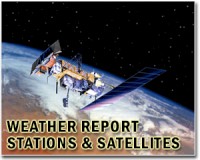| . |  |
. |
Fairfax VA (SPX) Mar 30, 2010 In a time when only a handful of TV news stations employ a dedicated science reporter, TV weathercasters may seem like the logical people to fill that role, and in many cases they do. In the largest and most representative survey of television weathercasters to date, George Mason University's Center for Climate Change Communication shows that two-thirds of weathercasters are interested in reporting on climate change, and many say they are already filling a role as an informal science educator. "Our surveys of the public have shown that many Americans are looking to their local TV weathercaster for information about global warming," says Edward Maibach, director of the Center for Climate Change Communication. "The findings of this latest survey show that TV weathercasters play-or can play-an important role as informal climate change educators." According to the survey, climate change is already one of the most common science topics TV weathercasters discuss-most commonly at speaking events, but also at the beginning or end of their on-air segments, on blogs and web sites, on the radio and in newspaper columns. Weathercasters also indicated that they are interested in personalizing the story for their local viewers-reporting on local stories such as potential flooding/drought, extreme heat events, air quality and crops. About one-quarter of respondents said they have already seen evidence of climate change in their local weather patterns. "Only about 10 percent of TV stations have a dedicated specialist to cover these topics," says University of Texas journalism professor Kristopher Wilson, a collaborator on the survey. "By default, and in many cases by choice, science stories become the domain of the only scientifically trained person in the newsroom-weathercasters." Many of the weathercasters said that having access to resources such as climate scientists to interview and high-quality graphics and animations to use on-air would increase their ability to educate the public about climate change. However, despite their interest in reporting more on this issue, the majority of weathercasters (61 percent) feel there is a lot of disagreement among scientists about the issue of global warming. Though 54 percent indicated that global warming is happening, 25 percent indicated it isn't, and 21 percent say they don't know yet. "A recent survey showed that more than 96 percent of leading climate scientists are convinced that global warming is real and that human activity is a significant cause of the warming," says Maibach. "Climate scientists may need to make their case directly to America's weathercasters, because these two groups appear to have a very different understanding about the scientific consensus on climate change." This survey is one part of a National Science Foundation-funded research project on meteorologists. Using this data, Maibach and his research team will next conduct a field test of 30-second, broadcast-quality educational segments that TV weathercasters can use in their daily broadcasts to educate viewers about the link between predicted (or current) extreme weather events in that media market and the changing global climate. Ultimately, the team hopes to answer key research questions supporting efforts to activate TV meteorologists nationwide as an important source of informal science education about climate change.
Share This Article With Planet Earth
Related Links George Mason University Weather News at TerraDaily.com
 African weather ministers hold first meet in April: WMO
African weather ministers hold first meet in April: WMOGeneva (AFP) March 16, 2010 African ministers dealing with climate are to gather mid-April in Kenya's capital Nairobi for the first time in an attempt to strengthen crucial weather forecasting, the UN weather agency said Tuesday. Underlining the importance of the conference, the head of the World Meteorological Organisation, Michel Jarraud, said that "many countries in Africa are very vulnerable to climate variability ... read more |
|
| The content herein, unless otherwise known to be public domain, are Copyright 1995-2010 - SpaceDaily. AFP and UPI Wire Stories are copyright Agence France-Presse and United Press International. ESA Portal Reports are copyright European Space Agency. All NASA sourced material is public domain. Additional copyrights may apply in whole or part to other bona fide parties. Advertising does not imply endorsement,agreement or approval of any opinions, statements or information provided by SpaceDaily on any Web page published or hosted by SpaceDaily. Privacy Statement |